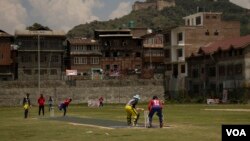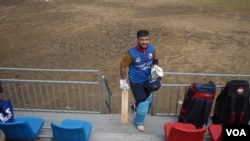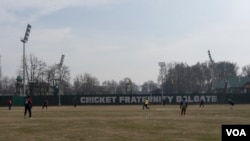The blanket of snow covering one of the prominent cricket grounds at the Magam neighborhood of Budgam district on the Indian side of Kashmir has melted. The ground is set to host a monthlong local cricket tournament from March 3. Hundreds of youths from various parts of the valley will compete for a $3,000 cash prize.
Cricket, originating in Britain, was historically enjoyed for fitness and leisure. It is the second most popular sport worldwide after soccer with approximately 2 billion fans and is the most commonly played game in the Himalayan region. However, the sport has now become a source of income for thousands of individuals in Kashmir amid rising unemployment.
"Every year hundreds of tournaments are organized by local people without any help from the government. Thousands of people, including players, commentators, broadcasters, umpires, etcetera make a living by being part of these tournaments," Mushtaq War, a local cricket tournament broadcaster on social media, told VOA. "The match fee varies according to the talent of an individual ranging from $10 to $75 per game," he added.
According to War, everyone associated with local cricket tournaments makes enough money to support their families.
"Sixty-four teams will be part of the Magam tournament," War said. "The entire money will be circulated among the people involved in the tournament directly or indirectly," he added.
Imtiyaz Ahmad Munshi, a member of local cricket organization Cricket Fraternity Dalgate, told VOA that funds to host local tournaments primarily come from tournament fees and sponsorships provided by local businessmen.
"Teams hailing from north, south, and central Kashmir participate in these tournaments after paying the entry fee," Munshi said. "Local businessmen support organizers by sponsoring these events," he said, adding that sponsors in return receive benefits such as "tax reductions for promoting sports."
Munish alleged organizers lack support from the Jammu Kashmir Cricket Association, or JKCA, a registered Society that runs cricket in Jammu and Kashmir, and J&K Sports Council, a government body responsible for the promotion and development of sports in J&K, despite the fact that they are promoting and encouraging youngsters to participate in sports related activities.
Majid Dar, a JKCA Cricket Development official, told VOA that the cricket body of Kashmir only facilitates the events affiliated with BCCI, the governing body of Cricket in India. 'We cannot provide any kind of facility to anyone. We have a busy schedule and besides all this we provide employment to 150 people in Jammu and Kashmir," Dar said.
"JKCA is not visible when it comes to organizing local cricket tournaments. Moreover, J&K Sports Council charges a hefty amount from organizers to conduct cricket tournaments," Munshi said. "We don’t refuse to pay the money but we expect the J&K Sports Council to maintain the fields at least," he said, adding that at present even a brief drizzle renders the grounds unfit for play for several days due to "water accumulation."
"Players and organizers have on multiple occasions contributed from their own pockets to maintain the condition of the ground," Munshi said. "Youth expect the same level of commitment from the government," he added.
Nuzhat Gull, secretary of the J&K Sports Council, told VOA her office collects fees from organizers of commercial tournaments, clarifying that such events do not fall under the Prime Minister’s Sports Development Scheme. The scheme is designed to enhance sports infrastructure and foster sporting activities throughout India.
"We don’t impose fees for non-commercial sporting events," Gull told VOA. "However, for commercial cricket tournaments organizers are required to cover expenses and the department doesn’t offer exemptions in such instances," she said.
Faisal Dar, a young cricketer from the Dalgate neighborhood of Srinagar, expressed disappointment and highlighted the disparity between the efforts of local communities and the government in actively involving youth in sports.
"Government officials often only help those they favor leaving the rest feeling ignored," Dar said. "We would have been happier if the government built better sports facilities and helped folks like us who rely on local tournaments for a living," he added. Gull told VOA the criticisms of the council are "all baseless," and refused further comment.
Dar said they approached authorities many times to install high-intensity artificial light to promote night sports in Kashmir, especially in Srinagar and other major cities and towns.
"Not much has been done regarding the installation of the night lights," Dar said. "Locals are taking on responsibilities that should be handled by the government yet the government claims credit for everything," he added.
The people organizing local events, Dar said, have saved the lives of many individuals. He said that many athletes were depressed or were using drugs because of unemployment.
"These organizers let them play cricket again and even helped them find jobs thus allowing them a fresh beginning in life," he said. "If this is not service to humanity, I wonder what is?" he said, adding Kashmir needs such attempts or else people will suffer a lot "physically as well as mentally."







